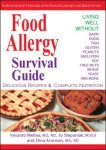Does Early Exposure to Food Allergens Increase Tolerance to Them?
by www.SixWise.com
Food allergies affect 1 percent to 2 percent of American
adults, according to the American College of Allergy, Asthma
& Immunology (ACAAI), along with about 6 percent of children
under the age of 5. While their incidence in the United States
has been on the rise for at least a decade, no one knows exactly
why food allergies are becoming more and more common. Meanwhile,
for those in this group just one crumb of an allergenic food
can be deadly.
What is a Food Allergy, and Why do They Occur?
|

For people with food allergies, just one bite of the
wrong food can lead to hives, vomiting, loss of consciousness
and even death.
|
A food allergy occurs because your immune system mistakenly
recognizes a certain food as dangerous, and then produces
a response against it. Symptoms can range from the more mild
skin rash, vomiting and diarrhea to the very serious anaphylaxis,
which constricts the airways and requires immediate medical
attention.
Though most food allergies begin in childhood, before the
age of 2, they can occur at any age and involve just about
any food. That said, there are eight foods that cause 90 percent
of food allergies, and these are:
While no one knows exactly why food allergies appear in some
people and not others, one common factor is heredity. If both
of your parents have allergies, you have about a 75 percent
chance of being allergic as well, according to ACAAI. Meanwhile,
if one parent or one side of your family's relatives has allergies,
your risk drops to about 30 percent to 40 percent, while those
with no family history of allergies have about a 10 percent
to 15 percent risk.
Does Early Exposure to Allergens Help or Hurt Food Allergies?
|

Parents are often warned not to give young children
allergenic foods like milk, wheat, peanuts and eggs
until they reach a certain age in order to reduce their
risk of allergies, but a new study is challenging this
theory.
|
There is a controversy brewing over the common advice to
NOT feed young children highly allergenic foods (like milk,
wheat and eggs) until they are anywhere from 6 months to 2
years old. The theory holds that because young children's
digestive systems have not yet matured, giving these foods
to infants increases the risk that their body will absorb
food proteins that may trigger allergies.
However, a new study published in the Journal of Allergy
and Clinical Immunology found quite the opposite of this theory.
According to the study, which examined premature and low birth
weight babies (which have immature gastrointestinal tracts),
exposing such infants to food allergens early in life may
actually boost tolerance later in life.
Specifically, the researchers found no association at all
between age, birth weight and the development of food allergies.
"The theory is that at a young age (less than 3 years),
an immature and permeable gastrointestinal tract will result
in increased antigen uptake. Thus, highly allergenic foods
may be absorbed more easily, increasing the risk for sensitization,"
said the study's lead author Joel Liem from the University
of Manitoba. He continued:
|
Got Food Allergies?
Get The Food Allergy Survival Guide Book!
 For
a complete guide on how to eat if you have food allergies
and intolerances, check out the highly recommended Food
Allergy Survival Guide Book. In it you'll learn: For
a complete guide on how to eat if you have food allergies
and intolerances, check out the highly recommended Food
Allergy Survival Guide Book. In it you'll learn:
-
How to avoid the foods and ingredients that trigger
reactions
-
How to substitute healthful ingredients for those
that trigger allergic responses
-
How to meet recommended nutrient intakes while
avoiding trigger foods such as dairy products, eggs,
gluten-containing grains such as wheat, or other
food culprits
-
How to determine which food(s) may be triggers
for your symptoms ... and much more!
Find
out More About The Food Allergy Survival Guide Book
Now!
|
"However, our large, population-based epidemiologic
study does not support [this]. A possible mechanism preventing
sensitization might be the development of immunologic tolerance
to orally ingested allergens in premature infants.
"Such tolerance might result from interaction of high
antigen concentration with the immature immune system of the
preterm infant ... These data prompt us to ask whether
it may be possible that introducing highly allergenic proteins
(such as peanut) early in life would tolerize (as opposed
to sensitize) a child to that particular antigen."
The researchers are calling for more studies to confirm what
is the best way to introduce foods to infants.
Interestingly, their findings are similar to those of the
"hygiene hypothesis," which says that children who
are not exposed to some dirt and germs at an early age (due
to living in an overly sterile, "hygienic" environment)
are at an increased risk of allergies. Why? Because their
developing immune systems didn't get exposed to many germs,
they didn't get a chance to develop a tolerance to them.
What to do if You Already Have a Food Allergy
While researchers uncover more about food allergy triggers,
there are a number of resources for those who already have
them. These include:
-
Strictly avoiding the food you are allergic to, including
any related products.
-
Diligently reading food labels (hidden ingredients, particularly
with wheat and peanuts, can be anywhere, but the Food
and Drug Administration requires that at least the top
eight allergens must be clearly stated on food labels).
-
Letting the server in a restaurant know you absolutely
cannot have certain ingredients.
-
For those with severe food allergies, always carrying
a self-injectable epinephrine (often called an Epipen)
in case of emergency.
Also, be sure to check out The
Food Allergy Survival Guide Book, our top-recommended
source for anyone with food allergies.
You'll learn what your food triggers might be, how to avoid
them, easy-to-use, healthy alternatives, and even great-tasting
allergen-free recipes (like Ultra Fudge Brownies, Divine Macaroons,
Banana Bread and many more!).
Recommended Reading
50%
of U.S. Population Has Allergies, Most Don't Realize It &
Suffer Unnecessarily ... Do You?
The
Top 8 Foods People Are Most Sensitive To -- Without Even Knowing
It!
Sources
Journal
of Allergy and Clinical Immunology, May 2007, Volume 119,
Issue 5, Pages 1203-1209
American
College of Allergy, Asthma & Immunology
FoodNavigator-USA.com
April 30, 2007